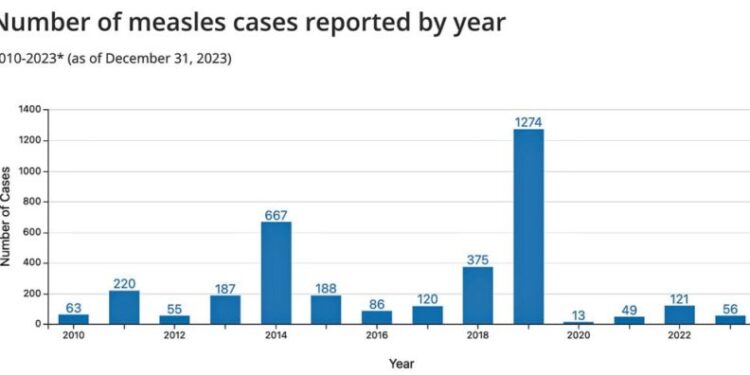Measles outbreaks have once again made headlines, with several cases reported in different states in the U.S. and the United Kingdom. The media has attributed these outbreaks to declining vaccination rates among children and international travel. However, experts argue that this assumption may not be entirely accurate.
Dr. Liz Mumper, a pediatrician, points out that cyclical outbreaks can still occur even in populations with high vaccination rates. She mentions that even college students, who are often fully vaccinated, can experience outbreaks. Dr. Paul Thomas, a retired pediatrician and author, adds that there have not been any significant measles outbreaks in the U.S. for decades.
It is important to note that measles was declared eliminated in the U.S. in 2000, meaning there was no continuous transmission. Mortality from measles has significantly declined in the 20th century due to improvements in living conditions, healthcare, and nutrition. Since 2000, there have only been four measles deaths in the Americas.
The majority of measles deaths occur in countries with weak health infrastructures and vitamin A deficiency. In developed countries, fatalities from measles are rare. Effective treatments for measles include high doses of vitamin A and attention to hydration status.
The introduction of the measles vaccine in 1963 significantly reduced the number of reported cases. However, experts acknowledge that vaccine-induced immunity wanes over time. Dr. Mumper suggests that catching measles naturally through respiratory spread may provide lifelong and more effective immunity compared to vaccination.
While approximately 83% of children globally received one dose of the MMR vaccine by their first birthday in 2022, recent measles outbreaks have led to a push for adults to consider receiving another MMR vaccine. Dr. Derek Gatherer suggests that even adults who are already vaccinated should consider getting additional doses to prevent asymptomatic infections from spreading.
The media often blames the “anti-vaxxers” for measles outbreaks, linking them to lower vaccination rates among children. However, experts argue that the decline in vaccination rates has been minimal and may not significantly impact infection rates. They also highlight the growing body of evidence suggesting a link between the MMR vaccine and autism in susceptible children.







